‘For us, students, picking up discarded cardboard from the streets for recycling was a fresh experience. However, we’re aware that for those scavengers who depend on this task for a living, it’s far from a walk in the park… Recycling cardboard is hard work. Yet, the financial gain is depressingly low, and a truckload of cardboard only pulls in around MOP 50.’
These are the reflections of students at the University of Macau (UM) Stanley Ho East Asia College (SHEAC) on their participation in a cardboard recycling activity. The activity was part of a series organised by the college in 2023, which aimed to let students understand the plight of the underprivileged. By collecting and recycling cardboard on the streets, the students experienced first-hand the laborious work undertaken by waste pickers and the obstacles they encounter.
Mobilising Students for Social Services
SHEAC has spared no effort in promoting diverse and sustainable social services. We believe that one of the key values of the college lies in its capacity to foster community connections and encourage students to serve the community. Service learning offers students the opportunity to engage in various social services, which, in turn, helps them discover their interests and strengths and identify areas they wish to explore further. Following their involvement in the ‘Soup for Love’ campaign launched by the college in 2022 to support local elderly citizens living alone, several students assisted in coordinating the campaign this year.
Social services often bring students into contact with minority groups that they seldom interact with in their daily lives. This year, we led our students to join the Eid al-Fitr (a global Muslim festival marking the end of Ramadan) celebrations organised by Indonesian domestic helpers in Macao. During the event, the students gained a deeper understanding of the challenges and joys experienced by domestic workers living in Macao. For example, they learned that those who have work experience in Hong Kong, Taiwan, and Macao generally prefer to work in Macao as local regulations do not require them to live with their employers, which they greatly appreciate. Many also find employers in Macao are generally friendlier and more approachable.
Had they not participated in such activities, students may only be aware of the challenges these domestic helpers face in Macao, such as dealing with demanding employers and the difficulty finding food products made in their homelands. By listening to the views of ethnic minorities and learning about their working conditions in Macao, the students managed to debunk various stereotypes and misconceptions about them. This experience fostered a more diverse and inclusive perspective among the students.
Addressing a Broad Spectrum of Social Issues
The concrete examples mentioned above illustrate the concept of service learning, a significant aspect of SHEAC’s educational ethos. The college provides a range of social services, including collecting leftovers from markets, beach clean-ups, supporting fundraising efforts for poverty alleviation organisations, volunteering with animal welfare groups, and organising activities for children with special educational needs. These initiatives address a broad spectrum of social issues, including global economic disparity, climate change, poverty, vulnerable groups, and animal rights.
However, overemphasising diversity in service-learning activities may run the risk of reducing recipients of student services to mere ‘consumer commodities’ that cater only to our students’ personal growth. If our interactions with the elderly living alone are limited to annual visits, then these encounters will be nothing more than eye-opening experiences. We strongly believe that the essence of social services lies in this continuous commitment. Only through ongoing service learning can students truly understand the needs of those they serve. Imagine how those elderly living alone would feel if every time they were visited by a new group of students who only engaged in introductory small talk rather than in-depth conversations.
As exemplified by the students mentioned at the beginning of this article, a one-time service-learning experience can be eye-opening but it fails to provide participants with a deep understanding of the scavengers’ situation. Recognising this, we continue to partner with our students to provide sustained support and care to underprivileged groups in Macao, including monthly visits to grassroots elderly people and regular interaction with ethnic minorities.
In What to Study at University (original Japanese title: 大学で何を学ぶか), renowned Japanese sociologist Taizo Kato encourages university students to find interests that they are passionate about and that they can continue to develop throughout their four-year academic journey. The professional knowledge students acquire in faculties at UM may be the ‘interest’ they wanted to pursue when they enrolled at the university. However, we aspire to offer another possibility. Through diverse service-learning activities, we aim to broaden students’ horizons and help them identify ‘interests’ to which they are prepared to devote themselves without feeling constrained. They may ultimately incorporate these interests into their habits and attitudes, thereby nurturing a lifelong commitment to serving society.
Author:
Saul Chan is a resident fellow in Stanley Ho East Asia College and an adjunct lecturer in the Centre for Macau Studies at the University of Macau (UM). He holds a PhD in sociology from UM. His research interests include migrant workers and new immigrants, as well as poverty and welfare systems.
Text / Saul Chan
Photo / Senior UM Reporter Matt Lio, with some provided by Stanley Ho East Asia College
English Translation / Debby Seng
Source: UMagazine ISSUE 28
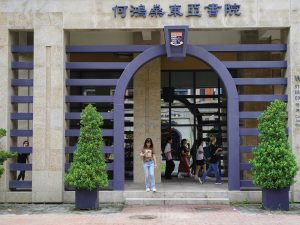
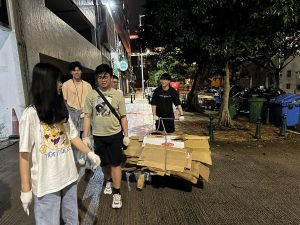
SHEAC students participate in a cardboard recycling activity in Macao’s ZAPE district to experience the life of scavengers while learning about the downward trend in recycling pric
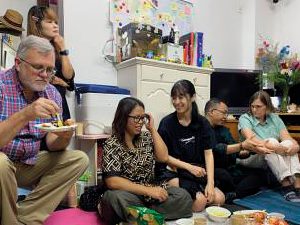
In the 2022/2023 academic year, SHEAC fellows led students to participate in two events organised by Indonesian domestic workers in Macao, namely a celebration of Eid al-Fitr and a
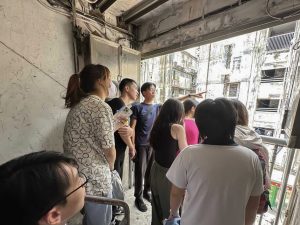
Students participate in SHEAC’s community docent training programme
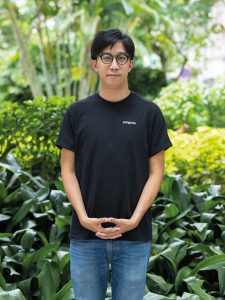
Saul Chan
